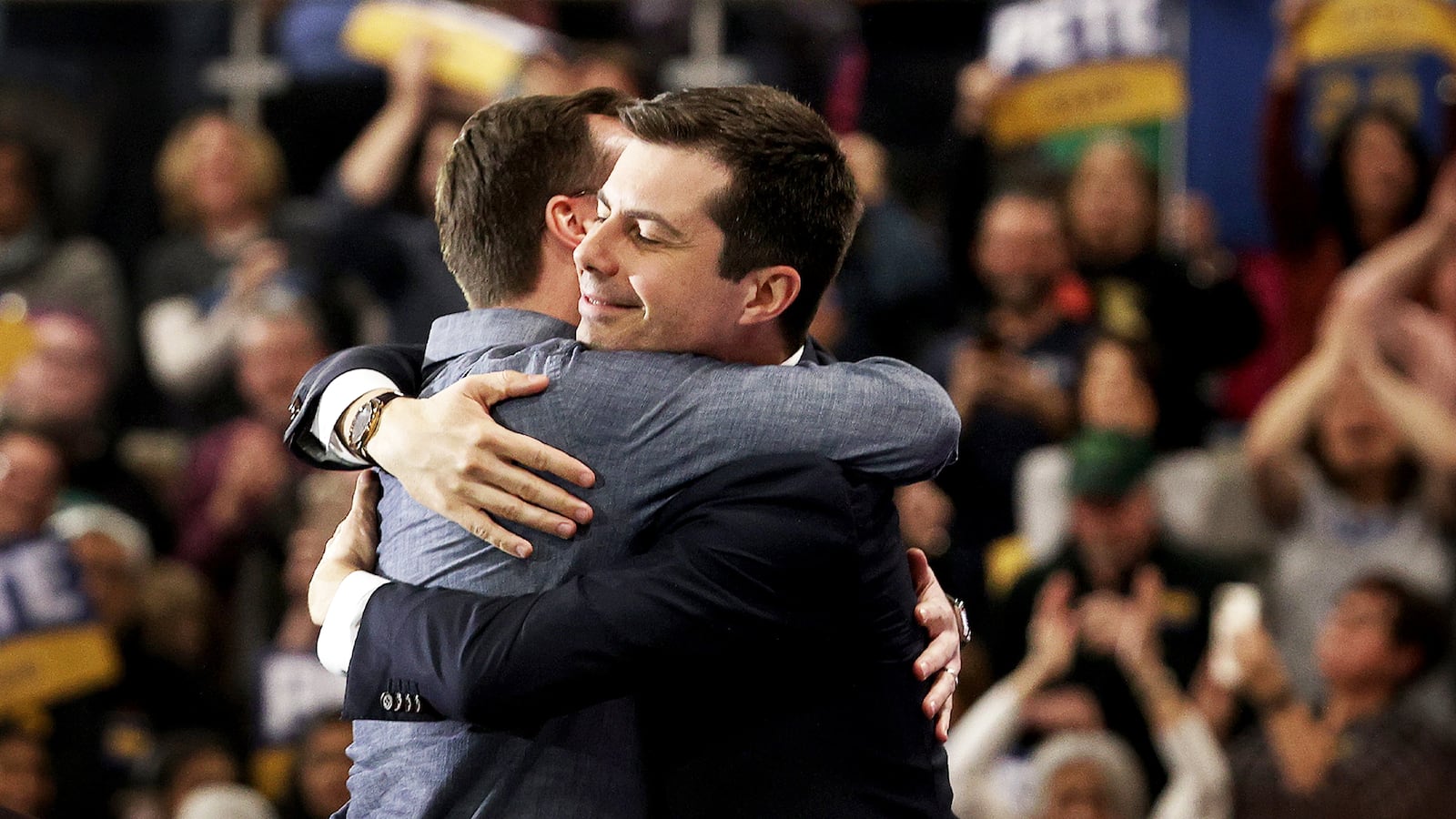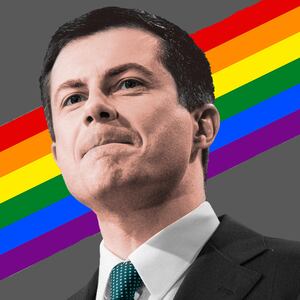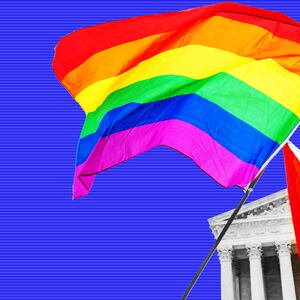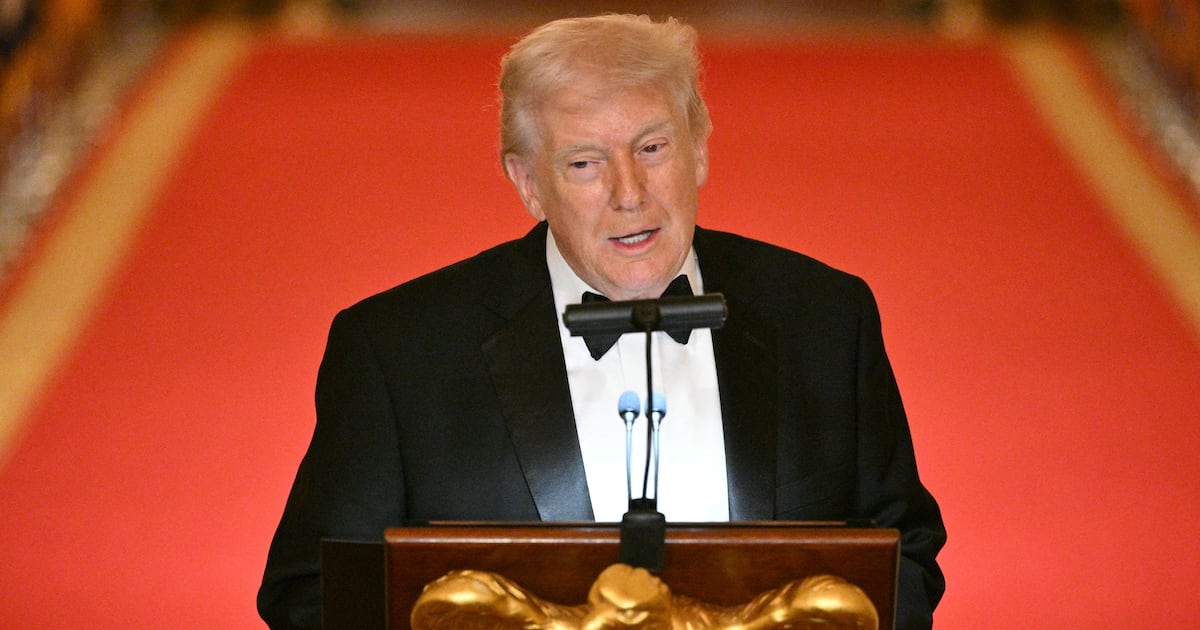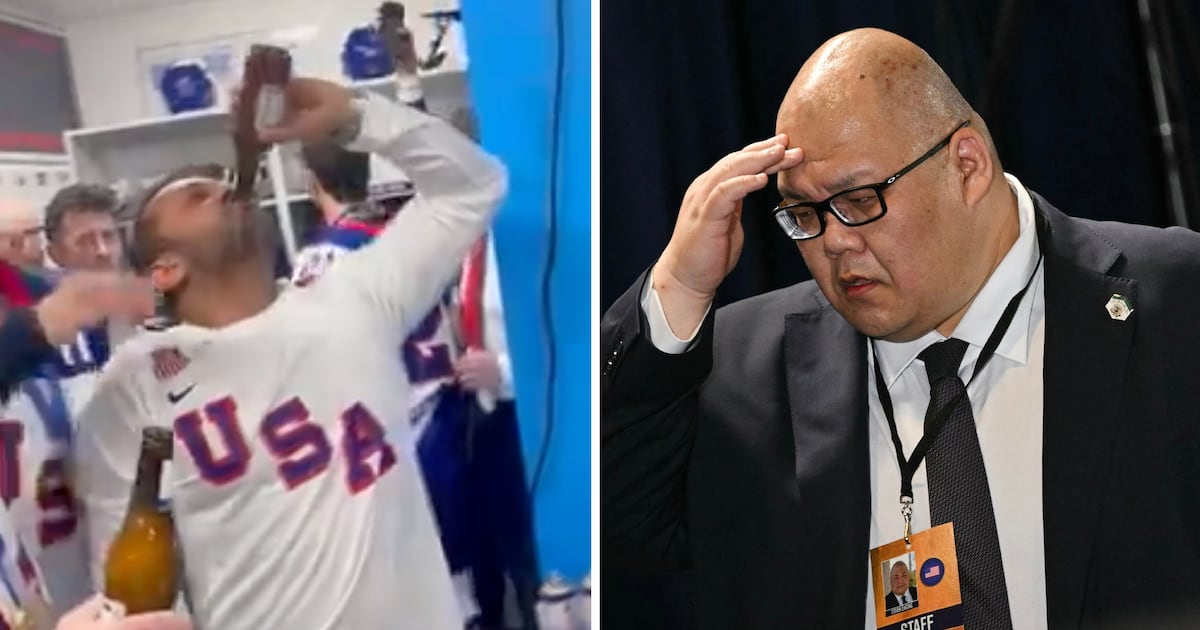The opinion pieces, the social media fracas, the intra-LGBTQ disagreements over Pete Buttigieg and what he meant as a gay presidential candidate have spanned the months of his history-making run for office, which ended on Sunday night.
It has been, simply put, exhausting and not a little depressing, with Buttigieg’s candidacy seen in starkly polarized terms: a celebration of progress or an indictment of heteronormativity; a gay man standing on the American national stage, speaking eloquently about his own struggle for self-acceptance; or just another privileged white man able to “pass” without offering much to LGBTQ people who are not what he is perceived to be.
Instead of feeling what it was—momentous, a real moment of gay pride and political change in the 50th anniversary year of the Stonewall Riots—Buttigieg’s candidacy often felt like a vituperatively disputed LGBTQ cultural flashpoint, a vexed Rubik’s Cube of debates around sexuality and identity with no solution, and lots of flushed cheeks and raised voices.
To be clear: When an out-gay man running for president is being judged for not being “gay enough” by other LGBTQ people, that is not a symbol of progress or evolution, but rather an example of one set of barriers of entry being substituted for another.
Buttigieg may not be your idea of what a gay man should be, but if in your next breath you are arguing for the power of plural LGBTQ identities, then you are arguing against yourself. Buttigieg is his own person, and a set of LGBTQ identities both unique to himself and shared with others. If you do not accept Pete Buttigieg for who he is, you’re not as accepting of diversity as you claim to be.
His presidential run is now over, but the Buttigieg Effect will go on. It will ripple outwards. Whether you, as a LGBTQ person, loved or did not love Pete Buttigieg, he—and other LGBTQ political history-makers like Danica Roem in Virginia—have changed the playing field for LGBTQ candidates coming after them.
Buttigieg showed it was possible for a LGTBQ candidate to go for the big prize in a convincing fashion, and he showed the breadth of what that candidate could say or do—or be—in that space. As his example encourages other LGBTQ candidates to stand, the diversity of those candidates will increase. Buttigieg is a leader, history-maker, an avatar of change—and as such others will follow him. This is, one hopes, just a political beginning.
He was the first openly gay person to win a nominating contest in American history, and on Sunday said he hoped “we sent a message to every kid out there wondering if whatever marks them as different means that they are somehow destined to be less-than.”
He is right. The simple fact of Buttigieg’s visibility as a gay man is, or was, important. Here was a gay man taking his place on a presidential candidate debate stage (and winning the Iowa caucus) where his sexuality was known and occasionally central—a significant story, but never the whole story. He faced prejudice, and did so by taking on the bigots, and winning, in their own space.
Liberal chatterers like to think they are beyond such things as homophobia. But where are their so-over-Pete-being-gay voices as the Trump administration continues to attack LGBTQ people and their rights? Absent.
Buttigieg did not just make history on paper; here was a gay man on the presidential campaign trail proud of being a gay man with a much-loved husband, and extremely proud of both (another sad reality this Sunday evening: America will now not have the witty and eloquent Chasten Buttigieg as its First Gentleman).
How Buttigieg was proud, what he said about this, and how he said it were the substance of disagreement. Over the last few months, I have variously read he was too calculated, he spoke too robotically, he was too guarded. Why did he leave it so long to come out? Why wasn’t he gay in a louder, brighter way? Why did he seem so cloaked in privilege?
LGBTQ people in public life tread tightropes, praised, condemned, criticized, and minutely observed. His detractors will never accept Buttigieg’s significance. They believe Buttigieg was too white, too (in old-school, linguistic terms) straight-acting, in some way, to really count as a gay man of 2020 making history. The simple rejoinder to this: Buttigieg was gay, and never said anything else.
This absurd LGBTQ purity test rang false when you watched how Buttigieg spoke about his sexuality on the campaign trail—honestly, clearly, and in a way no other public figure has done in the political realm. No, Buttigieg is not (if this is what you want) the gay foghorn, reeling off dime-store empowerment slogans. He didn’t come out when he was young. He is reticent. He looks nerdy, and sounds even nerdier. His alignment with corporations and the military was understandably alienating to many. His defeating lack of connection with black voters never changed.
Did Buttigieg perform in some way people found off-putting? Maybe. But that isn’t something unknown to LGBTQ people, particularly when we are in spaces where we are typically not. And all politicians are performers to a large degree; TV especially demands it. More pedestrian-ly, maybe Buttigieg is a stiff person, maybe he is not as ease as you would wish he was. Is he calculating? Maybe. But would that be such an unusual quality in a political power-player? Is it not a prerequisite for the job?
Here’s what Pete Buttigieg did on a national stage that his many critics have not given him full and proper credit for. He kissed and embraced his husband, and spoke lovingly about his husband too. He talked about faith, a province typically of those who seek to persecute LGBTQ people. He talked about coming out.
He told a young LGBTQ person, 9-year-old Zachary Ro, how brave he was to come out. He didn’t presume to give Zachary the accepted, syrupy “it gets better” gay liturgy. He just spoke to him evenly and responsibly, without presumption or being patronizing. An adult gay man shared a stage with a gay kid, and gently tried to advise him as an equal. Passing strength and courage between generations is one of the great LGBTQ acts of love and support.
None of this should be radical, for sure. “It shouldn’t matter,” people email me about Buttigieg being gay and being out. “Who cares?” No, being an out-LGBTQ person running for president shouldn’t matter. But still, it does.
I wonder if all those people who don’t care about Pete Buttigieg being gay are also extremely bothered by the Supreme Court currently considering if it should be OK to fire someone because they are LGBTQ; and soon to consider whether “religious freedom” can be used as Mike Pence and his ilk would like—as an all-purpose weapon against LGBTQ people wanting to adopt or foster children, and a whole lot more.
This is why Pete Buttigieg’s candidacy matters. Because it is happening in a country not OK with its LGBTQ people, and their presently imperiled equalities and rights. If you are so comfortable with Pete Buttigieg, then LGBTQ Americans could really do with your help fighting the onslaught of bigotry the Trump administration is visiting upon us.
Buttigieg faced the kind of homophobia that liberals like to tell themselves has been extinguished. It hasn’t. It was there the night of the Iowa caucuses, when a woman was filmed revealing she would not vote for him—up until then, her candidate of choice—just because he was gay. It all spewed out predictably: Bible this, sin that.
Then came Rush Limbaugh, with a prelude or warning of what would come Buttigieg’s way if he made it through the primary fire and became Trump’s opponent this November. Limbaugh is a homophobe in the classic vein, tellingly focused (like Erick Erickson) on gay people sexually, what we do to physically express our affection for one another.
Limbaugh did a vile bit of gaslighting: Oh, America wouldn’t like their president kissing another guy, he said. Then he just let his poison pill marinate in the public square. And there it was, the key to the homophobia the Republicans rely on to destroy candidates like Buttigieg—to simply hope voters can be galvanized by discomfort and disgust.
It’s the oldest way to stoke hatred, and it lies at the roots of all the anti-LGBTQ policies that officials try to inscribe in statute: “We don’t like what you do in bed. You’re unnatural.” Everything said to LGBTQ kids as they try to survive school, as they try to avoid the queer-basher’s fists, is what politicians and pundits use to stoke their hatred and perpetuate inequality.
That is what Pete Buttigieg faced every day overtly and covertly, that old, confected disgust about same-sex sex, long-baked into the public discourse over LGBTQ people and the laws crafted against us. And still, despite running this gauntlet, Buttigieg wasn’t “gay enough” for some. (Come on, he even got snipe-y with Amy Klobuchar. It was great TV, and pretty darn gay.)
Most powerfully perhaps (and again, something he has not been given enough credit for), Buttigieg also spoke about his faith, and not only that he posed his faith and its significance square against the faith that Pence and his evangelical peers invoke when they discriminate against LGBTQ people. Buttigieg made clear his God was just as important as the one the conservative right wing have co-opted as their battering ram against LGBTQ people.
“My marriage to Chasten has made me a better man. And yes, Mr. Vice President, it has moved me closer to God," Buttigieg said. “Speaking for myself, I can tell you that if me being gay was a choice, it was a choice that was made far, far above my pay grade. And that’s the thing I wish the Mike Pences of the world would understand. If you’ve got a problem with who I am, your problem is not with me. Your quarrel, sir, is with my creator.”
Buttigieg over and over again insisted on owning his faith, having pride in his faith, and bravely confronted his opponents on territory they covet as their own. And he did it with wit and mischief, as when Trump had recommended Limbaugh not apologize for what he had said about Buttigieg.
“The idea of the likes of Rush Limbaugh or Donald Trump lecturing anybody on family values—I mean, sorry but, one thing about my marriage is it’s never involved me having to send hush money to a porn star after cheating on my spouse with him or her,” Buttigieg said. “So they wanna debate family values? Let’s debate family values. I’m ready.”
Here again, Buttigieg headed into hostile territory—the “family values” rhetoric used to hurt LGBTQ people in so many ways for so many years. Buttigieg swiped the flaming torch and simply waved it back in the bigots’ faces.
Here, just as he has done with the issue of faith, Buttigieg said a firm “No” and reframed their words to mock their hypocrisy but also to show that LGBTQ people have ownership and presence in the “family” space too. He was doing something exceptionally queer and radical.
Buttigieg’s career, his presence in the public eye, is far from over, and as this chapter ends he has set a valuable example. In a country currently under the control of a virulently anti-LGBTQ administration, Buttigieg has shown not just that an LGBTQ person can run for president. He has shown that LGBTQ people can occupy spaces that those who discriminate against us have long sought to exclude us from. He has shown that LGBTQ people can do this while kissing their partners, while being out, and while skewering bigotry in such a way that leaves the bigots ammunition-less.
Not gay enough? Oh, Pete Buttigieg was way-gay, as his legacy will hopefully show.

